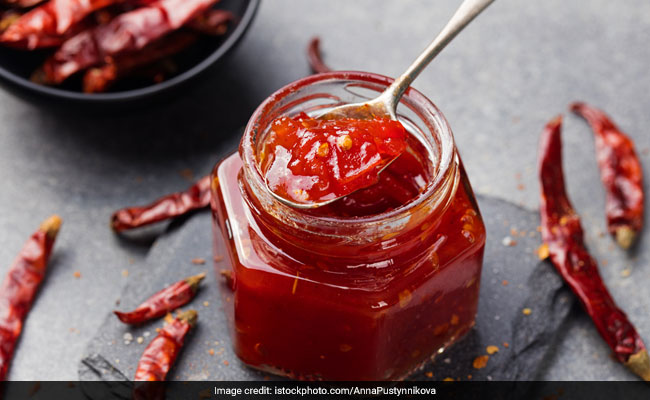4pm hunger pangs demand a bite of something delicious. Our dreams were recently answered when a local food stall outside the office started serving up a variety of momos. The best dish on his menu, arguably, is a plate of momos doused in a lip-smacking but mind-numbingly hot chilli sauce. The momos are so good that we can not help ordering them. These delicacies taste amazing but the after-taste they leave is almost like fire-in-the-mouth. The spice that you feel is the capsaicin, the active ingredient that binds to a special class of vanilloid receptor inside our mouth called VR1 receptors. After capsaicin binds to these receptors, the sensory neuron is depolarised, and it sends along a signal indicating the presence of spicy stimuli. Thanks heaven, we have ways to douse this fire and relieve our mouth. If your spice-tolerance levels are low like mine, this article is a lifesaver. Bookmark it, now.

Home remedies for spicy food: The spice that you feel is the capsaicin, the active ingredient
What happens when you eat something spicy?We have numerous taste buds that pick up different tastes like sweet, salty, bitter, etc. However, did you know that spicy is actually not a taste? Spicy foods like chilies activate pain receptors and send signals to the brain directly which help you interpret the food as being ‘hot'. This is why, spice does not only affect you when you eat it (as the mouth cavity is where taste buds lie) but also when the food touches certain exposed membranes like the nasal cavity, under the finger nails or the surface of the eye.
When the chemicals capsaicin (chillies) or piperine (pepper) or isothiocynanate (mustard and radish) hit your tongue, they make the mouth temporarily go numb. There is a myth that spicy foods kill your taste buds. Yes, extreme spices may do that (but taste buds grow back within two weeks so that shouldn't make you lose sleep). This loss of sensation in the mouth may lead you to believe otherwise. Don't. This numbing is actually the body's defence mechanism to protect itself against the pain induced by the spice. But this is temporary and the receptors go back to normal soon.(Also Read: 7 Amazing Home Remedies To Get Rid of Mouth Ulcers)

Home remedies for spicy food: This loss of sensation in the mouth may lead you to believe otherwise
Immediate steps to take
If you eat something very spicy and your mouth seems to be on fire, here are some home remedies that you bring to your rescue:
1. Dairy – This is the magic balm. A sip of cold milk or a spoon of yogurt will soothe your mouth and take away some of the burning sensation. A protein called casein present in dairy helps to break up the capsaicin and offer some relief from its effects. Milk is your go-to beverage to quiet the flames of spicy foods. Unlike water, which is made up of polar molecules, casein is non-polar, just like capsaicin. This results in repelling, which means it binds with the capsaicin and in doing so, it prevents from reaching the mouth's pain receptors. (Also Read: 7 Home Remedies For Indigestion)

Home remedies for spicy food: Milk is your go-to beverage to quiet the flames of spicy foods
2. Sugar or honey – Though you may think that the sweetness is what counters the spiciness, the truth lies elsewhere. If you've had a spoonful of that incredibly spicy gravy, it may do you good to head to the pantry and put half a teaspoon of sugar or honey on your tongue. If you have sugar cubes handy, you may suck on one for similar relief. The oil-based capsaicin gets absorbed by the sugar or honey and thus helps you feel better.

Home remedies for spicy food: If you have sugar cubes handy, you may suck on one for similar relief.
3. Starch – Reach for that fluffy bread or rice. Starch provides a natural barrier between capsaicin and your mouth, absorbing some of it in the process. Potatoes can also help; make sure they are boiled and are devoid of any masalas. Make sure you have a raw piece of bread that will help soothe your mouth immediately. In fact, you can eat boiled rice that will help act as an absorbent buffer.

Home remedies for spicy food: Make sure you have a raw piece of bread that will help soothe your mouth immediately
4. Tomatoes and lemons – As surprising as this sounds, it has its base in pure science. The acidity of the spice can get neutralized with these alkaline foods. Pick up that salad plate and munch on a few tomato pieces for immediate relief. Oranges, pineapple and lemon juice have similar properties. You can gargle using tomato juice; if not this remedy, eating raw tomatoes are another remedy for ulcers in the mouth.

Home remedies for spicy food: As surprising as this sounds, it has its base in pure science
But what about water?What is your natural reaction when you eat something spicy? Reach for a glass of water? Though it may seem appropriate as your mouth is literally on ‘fire', the water may not help at all. As mentioned above, capsaicin is a natural oil and oil and water do not mix. Thus, the water will not help reduce the effects of capsaicin on your membranes. Rather, it may help spread the oil to other parts of your mouth too. Try one of the remedies given above for instant relief.So there you have it. Thanks to this cheat sheet, we can still order those delicious and spicy gravy momos and live to tell the tale. Life is all about balance, after all.





